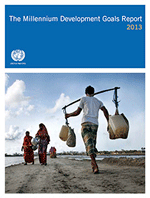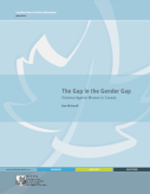Published on Thu, 2013-08-01 15:10
The global financial crisis led to greater job loss and poverty among women than men while rising food prices and responsibility for social reproduction take excessive tolls on the livelihoods of women. Financial crises and austerity measures to combat crises undermine the human rights to work, education, health and nourishment and the capacity to provide care and social reproduction. Their consequences are particularly acute for women who are held responsible for reproduction and face unequal gender relations that function to deny them access to resources and opportunities. Regulation and recovery must therefore be rooted in a human rights based approach taking special note of women's rights and impacts on social reproduction. |
Published on Wed, 2013-07-31 21:35
This year Social Watch Philippines and the Alternative Budget Initiative or ABI will particularly scrutinize the Priority Development Assistance Fund or “pork barrel” and the transfers and allocations for the government’s Special Purpose Funds. Department allocations will also be assessed by the Initiative, particularly the allocations for health, education, agriculture, social welfare and the environment. It’s that time of the year again when Congress debates and finalizes the National Budget for 2014. Budget hearings, pork barrels, agency allocations and special purpose funds will be, or should be, buzzwords in media for the next few months. |
Published on Fri, 2013-07-26 00:00
According to the Millennium Development Goals Report 2013, launched by UN Secretary-General Ban Ki-moon, since their adoption more than 13 years ago, significant and substantial progress has been made in meeting many of the eight Millennium Development Goals. However, progress is uneven, particularly for women and girls, and in many areas far from sufficient. Too many women around the world are still dying in childbirth when we have the means to save them; only 53 per cent of births in rural areas are attended by skilled health personnel. In developing regions, women are more likely than men to work as contributing family workers on farms or other family businesses, with little or no financial security or social benefits. The report also acknowledges that persisting gender-based inequalities in decision-making continue to deny women a say in the decisions that affect their lives. |
Published on Wed, 2013-07-24 22:00
A study released and authored by CCPA research associate and member of the Coordinating Committee of Social Watch Kate McInturff, says that progress on ending violence against women in Canada is stalled by the absence of a coherent national policy and consistent information about the levels of that violence. “The difficulty of collecting data about violence against women has been a barrier to progress in ending that violence,” says the study’s author Kate McInturff. “However, the data that does exist tells us three things very clearly: this problem is big, it comes at a high cost, and we are making little or no progress in putting a stop to it.” |
Published on Wed, 2013-07-24 18:08
"In the absence of widespread and sustained economic growth, unemployment remains at an unacceptably high level in many G20 countries," the International Labour Office (ILO) and the Organisation for Economic Cooperation and Development (OECD) have said. In a joint statistical update for the meeting of G20 Labour and Employment Ministers, taking place in Moscow from 18-19 July, the ILO and OECD warned that persistently high and mainly cyclical unemployment in several G20 countries is heightening the risks of labour market exclusion and structural unemployment. |
SUSCRIBE TO OUR NEWSLETTER







